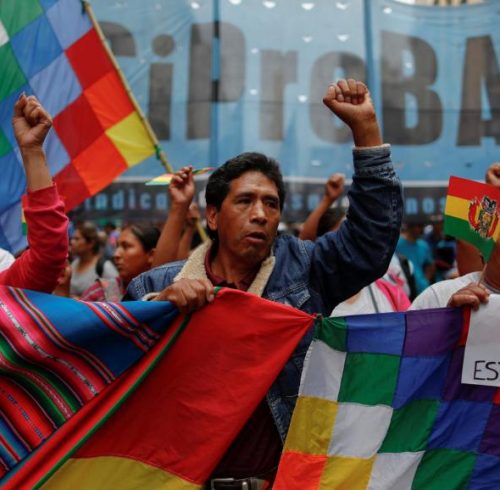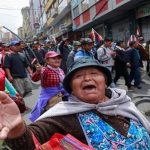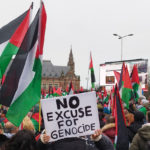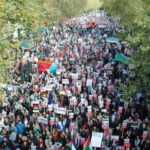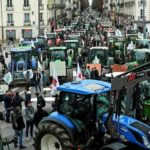LET US MOBILISE AND CONDEMN THIS STATE COUP ORCHESTRATED BY U.S. IMPERIALISM, WITH THE ACTIVE COMPLICITY OF THE RIGHT IN BOLIVIA, AIDED BY THE RIGHT IN COLOMBIA, PERU, BRAZIL AND ARGENTINA.
This coup means to interrupt a revolutionary process of great authority in the whole of Latin America. It is an attack on one of the most important pillars under the government of Venezuela.
Evo Morales had won the elections with a score of more than 10 points ahead of his rival Carlos Mesa who denounced the results even before they were known. Instead of calming the situation, the Organisation of the American States (OAS) spoke of irregularities, but these were only about 0.22% of the results and no one, anywhere, was calling for a second ballot.
Then there was no time to arrive at any agreement because of the opposition of the ‘Comites Civicos’ [1]. The one in Santa Cruz, led by Luis F. Camacho and paramilitary bands, is open to mercenaries. The latter go round intimidating the population with acts of violence, persecution, arson and assassination.
Under the recent governments of Evo Morales and vice President Alvaro Garcia Linera, measures were taken to recover the wealth of Bolivia and make it serve the Bolivian masses. The sources of fossil-fuel were nationalised in May 2006. The patrimony of the State enlarged and reached an average growth of 4.9% in recent years. The minimum wage was raised by 55 dollars to reach 308 dollars; moderate and extreme poverty were alleviated and unemployment was lowered to 4.2% according to most recent reports. There was growth in the fields of education and health. In 2008, the territory of Bolivia was declared free of illiteracy. The external debt was reduced. Important public works were started resulting in the ‘teleferico’ cable-car that links La Paz with Al Alto.
What economic and political interests lurk behind the coup and its United States backers? One answer is that Bolivia holds the biggest world reserve of lithium. This metal is used in the production of glass and ceramics, but it is also needed to make the batteries of electric cars. Bolivia is a big gas producer. It has important mineral resources, and all these things were recovered by the Morales’ left government.
On the political level, the Revolutionary State of Bolivia has a very important role. With other countries, it participates in the Alternativa Bolivariana para America Latina and the Caribbean (ALBA) set up in 2011 in Venezuela to form a bloc against poverty and social exclusion. This organisation rejects the ousting of Evo Morales; it can be expected to work for the revocation of this State coup.
The provisional government now in Bolivia draws upon the support of Trump, Bolsonaro (Brazil) and Duque (Colombia) while the European Union refuses to denounce it.
The latest measures of the provisional government include Bolivia’s withdrawal from ALBA, the sacking of 80% of Evos’ ambassadors, a sedition charge slapped on those on the left, the expulsion of 725 functionaries involved in cooperation with Cuba. The coup’s perpetrators expel foreigners and force nosy journalists out of the country; they don’t want reports to appear on the way they repress and persecute the population.
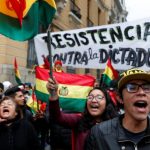
The indignant response of the masses was not long in coming. A multifaceted popular council was set up in El Alto to reject the coup.
It demands Evo Morales’ return and organises marches on La Paz.
The mobilised miners and sectors of the working class movement are moving towards the capital. The COB (Central Obrera de Bolivia) announced a General Strike. The coca leaf growers are on a war footing and the Potosi region has risen against the provisional government.
For the moment, there is no clear alternative to Evo. There is a power vacuum instead and the only sector loyal to the right, is the police. The Armed Forces are divided. The new woman-president had to name a new army chief because she did not trust the previous one.
Various things can happen, but what will continue – as the days go by – is the mobilisation of the Bolivian masses and the lack of social support for this government.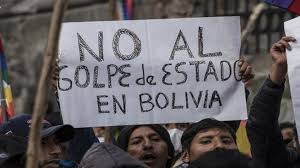
In Latin America and various European cities, there have been mobilisations in solidarity with the struggle of the Bolivian people. The governments of Mexico, Venezuela and Cuba support Evo. Alberto Fernandez, the newly elected president of Argentina, played a great role in assisting with the evacuation of Evo Morales and Garcia Linera out of Bolivia and into Mexico; he did this when all the neighbouring airspaces had been closed. The progressive governments of the region, those of now and those to come, know how to respond to the direct threats against them.
The left parties, the trade unions and the social movements need to continue and amplify their mobilisations. More pronouncements are needed to condemn this usurping act which encroaches on the popular will as it was expressed in the last elections.
There is indiscriminate repression against the Bolivian people, but neither the crimes nor the murders committed can hold back the determination of the masses to defend the conquest that the Revolutionary State means to them.
Posadistas Hoy, 22.11.19
